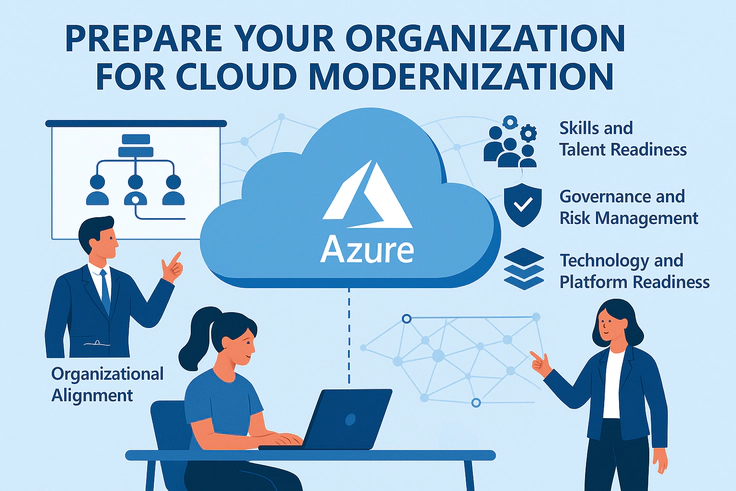Preparing Your Organization for Cloud Modernization with Azure CAF
A practical guide to aligning people, processes, and technology for successful cloud adoption
 Azure CAF provides a structured approach to organizational cloud readiness.
Azure CAF provides a structured approach to organizational cloud readiness.Why Cloud Modernization Needs More Than Technology
When organizations decide to modernize in the cloud, the first instinct is usually technical: refactoring apps, replatforming workloads, and scaling infrastructure. While these are critical, they are only part of the journey. True cloud modernization requires alignment of people, processes, and governance — and that’s where the Azure Cloud Adoption Framework (CAF) becomes essential.
Microsoft’s CAF provides a structured blueprint to help organizations prepare for modernization, ensuring that technology transformations are supported by organizational readiness.
Core Pillars of Modernization Readiness
1. Organizational Alignment
Modernization starts with a clear vision and sponsorship from leadership. Teams need to understand the why behind cloud adoption:
- What business outcomes are expected?
- How will modernization improve customer experience, agility, or cost efficiency?
CAF encourages establishing a cloud strategy team that communicates these goals and drives cultural change.
2. Skills and Talent Readiness
Cloud modernization demands new skills across DevOps, security, networking, and governance. CAF recommends:
- Skill assessments to identify gaps
- Role-based training paths (e.g., Azure Administrator, DevOps Engineer, Solutions Architect)
- Encouraging a cloud-first mindset across technical and business teams
Investing in people ensures that modernization doesn’t stall due to skill shortages.
3. Governance and Risk Management
Modernization without governance leads to chaos. CAF emphasizes:
- Defining guardrails and compliance policies early
- Establishing a Cloud Center of Excellence (CCoE)
- Using Azure Policy and Microsoft Defender for Cloud to enforce standards
This balances agility with control, enabling innovation while managing risk.
4. Operating Model Transformation
Moving to the cloud changes how IT operates:
- From reactive firefighting to proactive service management
- From siloed ops teams to cross-functional DevOps squads
- From manual processes to automation-first operations
CAF provides models to help organizations transition their operating practices in line with cloud-native principles.
5. Technology and Platform Readiness
Finally, modernization is about selecting the right cloud-native platforms:
- Modern app hosting (AKS, App Service, Container Apps)
- Data modernization (Azure SQL, Cosmos DB)
- Integrating DevOps pipelines for continuous deployment
CAF encourages a platform-first approach, building shared services that can scale across business units.
Bringing It All Together
Modernization is not a “lift-and-shift” — it’s an organizational transformation. The Azure Cloud Adoption Framework ensures that:
- Leaders define the vision
- Teams are trained and aligned
- Governance provides safe innovation
- Operations evolve into cloud-native models
- Platforms are ready to scale
Final Thoughts
Cloud modernization is a journey. By following the Azure CAF’s guidance, organizations can move beyond ad-hoc projects and build a sustainable modernization strategy that drives long-term business value.
If your organization is about to embark on this journey, start with people and processes before diving deep into technology — that’s the true accelerator for cloud success.
